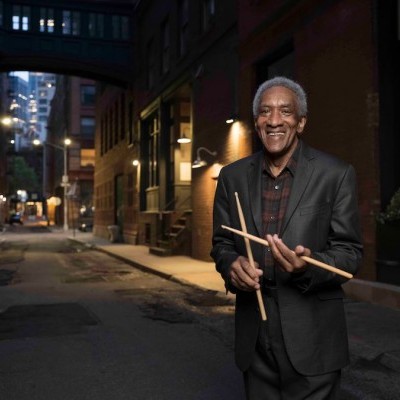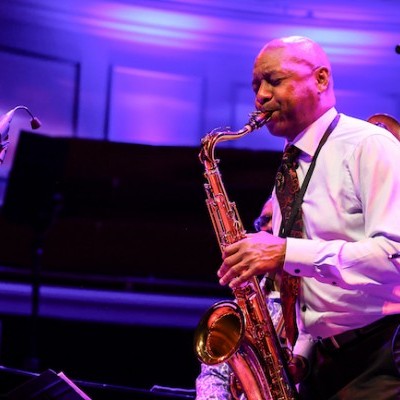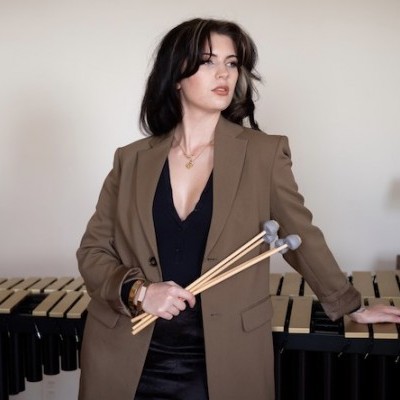Jun 3, 2025 11:25 AM
In Memoriam: Al Foster, 1943–2025
Al Foster, a drummer regarded for his fluency across the bebop, post-bop and funk/fusion lineages of jazz, died May 28…

Theon Cross’ instrument enables the bandleader to consider his attack from a unique vantage point, the tuba’s relative obsolescence in contemporary music alleviating him from the burden of comparison.
(Photo: Andy Earl)Even before releasing a full-length recording under his own name, Theon Cross had become a central figure of the contemporary UK jazz scene, his 2018 being a whir of activity with contributions to Sons Of Kemet’s Mercury Prize-nominated Your Queen Is A Reptile and penning the anthemic “Brockley” for Brownswood Recording’s We Out Here. Now, the tuba player is set to release his debut leader date, Fyah (Gearbox), on Feb. 15.
Cross shares with his London contemporaries a penchant for tweaking genre expectations, starting with, most obviously, his instrument. “People always underestimate the tuba,” he said recently. “People aren’t familiar with it, or associate it with playing on the 1 and 3, quite simply. If I play it through a whole gig, and it’s quite intricate, I can break people’s conception of what it is.”
Cross’ instincts for crisp melodies form the backbone of Fyah’s eight tracks, as his trio, featuring saxophonist Nubya Garcia and drummer Moses Boyd, tear through the recording at a decent clip. Opener “Activate” starts with a stomping groove that builds toward an increasingly complicated and energetic denouement. The song’s chugging momentum evidences Cross’ time playing with Kinetika Bloco—a youth organization that teaches South Londoners life skills through the art of marching bands—tying it all back to the New Orleans brass band tradition. Alternating between rhythm and lead, Cross weaves in and out of the melody alongside Garcia or doubles down on Boyd’s shifting drumming.
But his instrument enables the bandleader to consider his attack from a unique vantage point, the tuba’s relative obsolescence in contemporary music alleviating Cross from the burden of comparison.
“It’s definitely freeing to not have so much language imposing on it,” he said. “Saxophone or drums, people definitely expect a certain way or a certain school of playing. When I learned to play, I took influence from different instruments. I would transcribe Clifford Brown, and I got really into walking bass lines and Paul Chambers. But I’m also influenced by hip-hop or grime bass lines. It’s a horn and a bass instrument, so I can grapple onto whichever of those influences work.”
In addition to his facility on the instrument, the tubist’s abilities as a composer already have earned him notice amid a crowded and ascendant jazz community; his 2015 Aspirations EP earned a clutch of award nominations. A pair of tracks on Fyah, though, feature a larger group than he’s recorded with in the past, demonstrating an uncanny ability to write for a fecundity of voices. And throughout Cross’ leader debut, he avoids the temptation to solely compose around his instrument’s distinctive character.
“I always think of the melodic thing I want, bass-wise and melody-wise,” he said. “If I try to think what’s likely to work on the instrument, I think I might restrain myself or not write something as challenging. I think, sometimes, if you write away from the instrument itself, you just kind of think of it as sound. ... It’s more freeing.”
The art of jazz improvisation often finds itself contrasted with the nature of democracy, but over time, our collective memory transformed the music’s innovators into tyrants. For many fans and aesthetes, past accomplishments form an inviolable criterion, an impossible unit of measurement by which to judge any supposed progress. During the past five years, musicians on the London scene have worked to subvert some of these preconceptions, hoping to revitalize the form for a new generation of fans, listeners and would-be performers. That change, and his role in it, isn’t lost on Cross.
“If you take my music, or Ezra Collective’s, or Sons of Kemet’s, you can kind of hear the influences, the things that have influenced them outside of the swing rhythm,” he said. “With Kemet, you can hear everyone’s familiarity with Caribbean rhythms. We use our culture as an improvisational tool, as well as what we’ve kind of learned from having to transcribe the masters of American recordings. So, it’s almost like creating—I wouldn’t say a new language—but definitely a fresh kind of take.”
Cross and company’s rejiggering of tradition continues to attract audiences to venues not typically reserved for jazz players. But success brings change, a fact pertinent to both Cross and the scene he’s helped build. Just before the release of his leader date, he remained hopeful about his career and the community he’s inextricably linked to, while staying focused on the most essential element of his work.
“I titled the record Fyah not just because I think the music is good. ‘Fire,’ for me, as an element represents warmth and light,” Cross said. “I think our generation is about bringing positive energy. If any of us get into the position where we’re playing at Wembley, or we’re playing at big arenas, I want it to be the same energy as when we played at the small pubs in London, or at Steam Down or things like that. I want to do my best to stay grounded and to make music that heals me first. If it heals others, then that’s great. But ultimately, I need to heal myself first.” DB

Foster was truly a drummer to the stars, including Miles Davis, Sonny Rollins and Joe Henderson.
Jun 3, 2025 11:25 AM
Al Foster, a drummer regarded for his fluency across the bebop, post-bop and funk/fusion lineages of jazz, died May 28…

“Branford’s playing has steadily improved,” says younger brother Wynton Marsalis. “He’s just gotten more and more serious.”
May 20, 2025 11:58 AM
Branford Marsalis was on the road again. Coffee cup in hand, the saxophonist — sporting a gray hoodie and a look of…

“What did I want more of when I was this age?” Sasha Berliner asks when she’s in her teaching mode.
May 13, 2025 12:39 PM
Part of the jazz vibraphone conversation since her late teens, Sasha Berliner has long come across as a fully formed…

Roscoe Mitchell will receive a Lifetime Achievement award at this year’s Vision Festival.
May 27, 2025 6:21 PM
Arts for Art has announced the full lineup for the 2025 Vision Festival, which will run June 2–7 at Roulette…

Benny Benack III and his quartet took the Midwest Jazz Collective’s route for a test run this spring.
Jun 3, 2025 10:31 AM
The time and labor required to tour is, for many musicians, daunting at best and prohibitive at worst. It’s hardly…